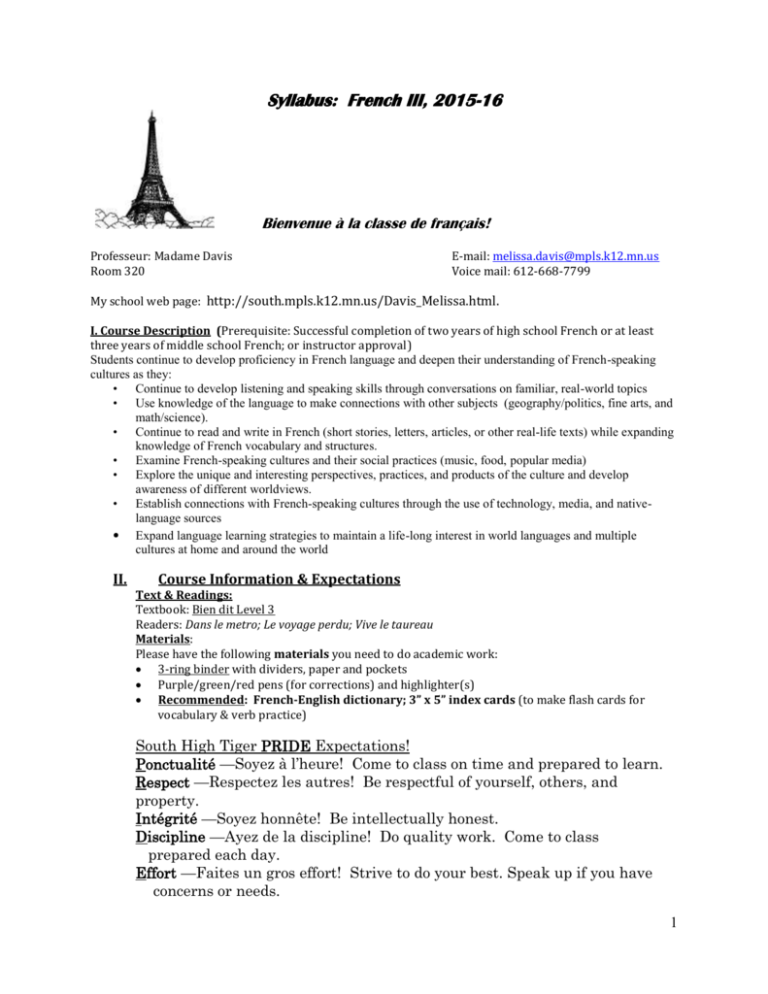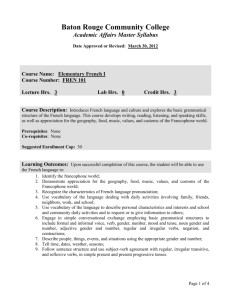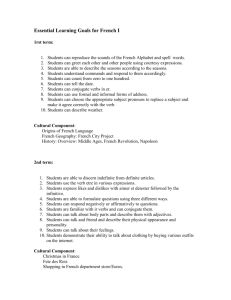Syllabus: French III, 2015-16
advertisement

Syllabus: French III, 2015-16 Bienvenue à la classe de français! Professeur: Madame Davis Room 320 E-mail: melissa.davis@mpls.k12.mn.us Voice mail: 612-668-7799 My school web page: http://south.mpls.k12.mn.us/Davis_Melissa.html. I. Course Description (Prerequisite: Successful completion of two years of high school French or at least three years of middle school French; or instructor approval) Students continue to develop proficiency in French language and deepen their understanding of French-speaking cultures as they: • Continue to develop listening and speaking skills through conversations on familiar, real-world topics • Use knowledge of the language to make connections with other subjects (geography/politics, fine arts, and math/science). • Continue to read and write in French (short stories, letters, articles, or other real-life texts) while expanding knowledge of French vocabulary and structures. • Examine French-speaking cultures and their social practices (music, food, popular media) • Explore the unique and interesting perspectives, practices, and products of the culture and develop awareness of different worldviews. • Establish connections with French-speaking cultures through the use of technology, media, and nativelanguage sources • Expand language learning strategies to maintain a life-long interest in world languages and multiple cultures at home and around the world II. Course Information & Expectations Text & Readings: Textbook: Bien dit Level 3 Readers: Dans le metro; Le voyage perdu; Vive le taureau Materials: Please have the following materials you need to do academic work: 3-ring binder with dividers, paper and pockets Purple/green/red pens (for corrections) and highlighter(s) Recommended: French-English dictionary; 3” x 5” index cards (to make flash cards for vocabulary & verb practice) South High Tiger PRIDE Expectations! Ponctualité —Soyez à l’heure! Come to class on time and prepared to learn. Respect —Respectez les autres! Be respectful of yourself, others, and property. Intégrité —Soyez honnête! Be intellectually honest. Discipline —Ayez de la discipline! Do quality work. Come to class prepared each day. Effort —Faites un gros effort! Strive to do your best. Speak up if you have concerns or needs. 1 Classroom Electronics Policy: Please do not use cell phones or other electronic devices during class time unless the teacher permits it for educational use only. Examples of acceptable use are looking up a French word on wordreference.com or on an app, a verb form on verb2verbe.com, or accessing other information for use related directly to class activities. Otherwise, please keep devices turned off and in your bags. The MPS responsible use personal electronics policy will apply (MPS Policy 5210). Inappropriate use of your electronic device will result in a warning first, then confiscation! III. Grading Information Grading policy: Assignments, Readings 15% Journals 5% Quizzes (announced & unannounced) 10% Written exams 35% Speaking assessments 10% Projects/Rédactions 15% Participation 10% Grading scale: 93-100% 90-92 87-89 83-86 80-82 A AB+ B B- 77-79 73-76 70-72 67-69 63-66 60-62 Below 60% C+ C CD+ D DF Make up and late work policies: Excused absences: You may make up assignments, journals, tests, and quizzes for full credit within two school days (more time may be allowed for extended absences). You will need to make up tests and quizzes before or after school. Unexcused absences: Work may be made up for half credit within two school days. If you skip class you will not be able to make up missed tests or quizzes. Late assignments will receive half credit. If you are absent you are responsible for getting the makeup work & notes and completing it on time. Talk to your classmates & teacher! IV. Participation & Attendance You can improve your language skills and succeed in the class by: attending class every day, on time actively participating and speaking only French in class and finding and seizing multiple opportunities to practice French making a real effort to speak French with your classmates and the teacher! integrating new vocabulary and structures into your speaking and writing. taking responsibility for your learning and putting forth your best effort in all work & activities thinking about the language and culture, making guesses about rules, testing and reforming them adhering to requirements, specifications and due dates Quarterly participation grades will be assigned based on rubric. 2 V. Standards and Proficiency Assessments: In the spring you may take the ELPAC, a proficiency assessment in the areas of speaking, listening, reading and writing that helps determine your readiness for the next level, College in the Schools French 4. The homework & class work, readings, communicative practice and assessments we do throughout the year will help you prepare for the ELPAC and the next level of French! Minneapolis World Language Standards included in this course: The MPS World Languages standards are based on the National Standards for Foreign Language Learning. * The National Standards set five interrelated goal areas for language learning. Goal One: 1.1 1.2 1.3 Goal Two: 2.1 2.2 Communication: Communicate in Languages Other than English Students will engage in conversations, provide and obtain information, express feelings and emotions, and exchange opinions. Students will understand and interpret written and spoken language on a variety of topics. Students convey information, concepts, and ideas to listeners and readers for a variety of purposes. Culture: Gain Knowledge and Understanding of Other Cultures Students demonstrate an understanding of the relationship between the perspectives and practices of cultures studied and use this knowledge to interact effectively in cultural contexts. Students demonstrate an understanding of the relationship between the perspectives and products /contribution of the cultures studied. Goal Three: 3.1 3.2 Connections: Connect with Other Disciplines and Acquire Information Students reinforce and further knowledge of other disciplines through world languages. Students acquire information and perspectives through use of authentic materials in the world languages and from the cultures. Goal Four: 4.1 Comparisons: Develop Insight into the Nature of Language and Culture Students recognize that different languages use different patterns to communicate and can apply this knowledge to their own language. Students recognize that different languages use different patterns of interaction and can apply this knowledge to their own culture. 4.2 Goal Five: 5.1 VI. Communities: Participate in Multilingual Communities at Home and Around the World Students use the language both within and beyond the school setting for a variety of purposes. Academic Honesty Policy Academic dishonesty in any portion of the academic work will result in a grade of “0” on that work. Academic dishonesty includes (but is not limited to) cheating on assignments or examinations, plagiarizing (misrepresenting as one’s own anything done by another), submitting the same or substantially similar papers (or creative work). Acceptable behavior: Asking someone how to do an assignment, or explain a concept Explaining how to do an assignment Comparing answers on an assignment to make sure you understood the concept Using a dictionary, translation software or website to translate a word) Unacceptable behavior: Copying answers from someone else Having someone else do your work, supply you with the answers, doing their work, or supplying answers Using translation software or website to translate a phrase, sentence, multiple phrases, or more 3 Copying and pasting from another document without using quotation marks and citing the author Any answer on a test or quiz that comes from a source other than your own mind Using an electronic device during a test or quiz. VII. Course content: Homework assignments, as well as test and project dates, will be announced in class and given on each unit’s “programme.” Chapter 1: Retour de vacances Unit 1: Je me présente: Faisons la connaissance (Ch. 1.1) Introductions, getting to know each other; course information and expectations; describe yourself & others; common, essential vocabulary from French I and II ; common regular & irregular verbs, likes/interests, near future); Qui suis-je? project Unit 2 : Retour de vacances—“Voici mon lycée” (Ch. 1.1) Understand & talk about school, classroom & daily routines; express likes, dislikes & preferences; ask about plans; compare French school days & American school days; Present tense (3 regular verb types & 6 irregular verbs), verbs followed by infinitive, reflexive verbs in present Culture & Lectures: Le baccalauréat, le lycée en France ; petit roman: Dans le métro Unit 3: Pendant les vacances… (Ch. 1.2) Vacation activities, describing activities and narrating events in the past; passé composé et imparfait; reflexive verbs in the passé composé Culture & Lectures: Les Grandes vacances et le tourisme en France; Project : Regions of France & overseas departments; Guadeloupe; literary excerpt “Un papillon dans la cité”; Unit 4 : L’avenir, projets, métiers et professions (Ch. 2.1) Future plans, jobs & professions, future and conditional tenses ; petit roman: Le Voyage perdu ; Boule de cristal project with future tense Unit 5: Il était une fois… (Ch. 3.1) Legends and fairytales of French-speaking countries around the world; read stories and write an original short story; passé simple; object pronouns Unit 6: La peinture française et l’impressionisme: Unit on French art, the impressionist art movement; research a French impressionist artist; field trip to the Minneapolis Institute of Arts Unit 7: Amours et amities (Ch. 4) Say what happened using reflexive verbs in the reciprocal sense (reciprocal actions and emotions); Sharing good and bad news and giving advice; past conditional and subjunctive; Hospitality, family, weddings in North Africa Unit 8 : En pleine nature (Ch. 5) Use the subjunctive to express astonishment and fear; les animaux sauvages et les sports extrêmes; the imperative and more with object pronouns Petit roman: Vive le taureau 4 PLEASE SIGN AND RETURN! Note: This syllabus can also be found on my school web page UNDER THE French 3 section: http://south.mpls.k12.mn.us/Davis_Melissa.html Syllabus: French III, 2015-16 STUDENT’S LAST NAME:___________________________FIRST NAME:_____________________ Period: ______ Students and parents/guardians: Please read all the above information and sign below. Return only this page to Madame Davis by __________________________ . Please save the rest of the syllabus for your reference. We have read the above syllabus for French III and understand the information and guidelines included. Student: I,___________________________,agree to the terms included in this syllabus. (Student signature) (Parent/guardian signature) Merci beaucoup! 5







